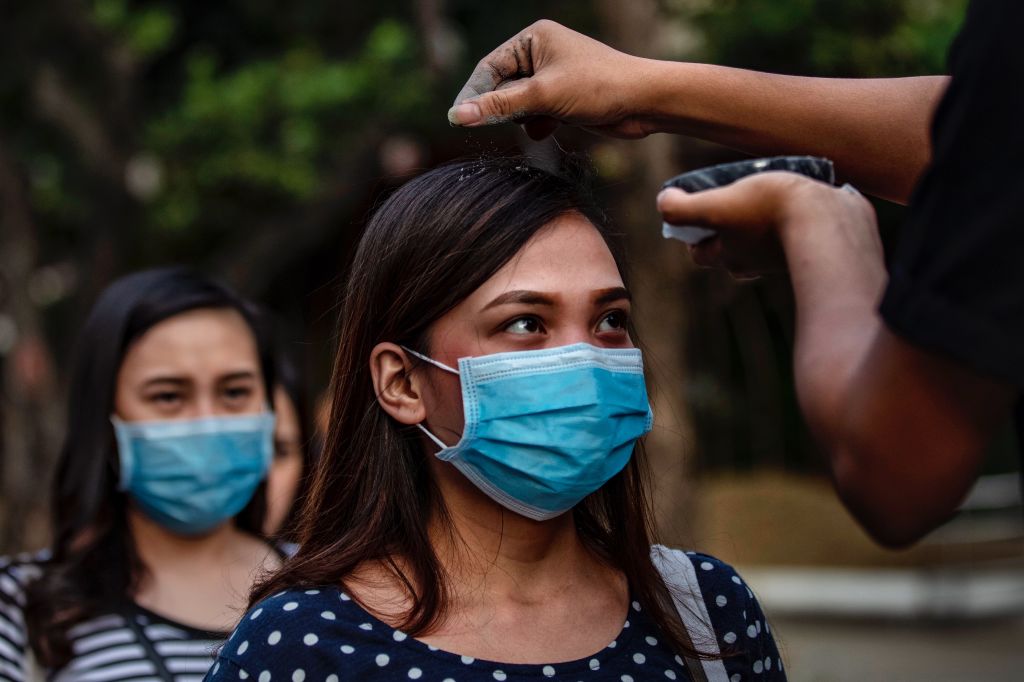Anyone who remembers Sars or Ebola will recall a feeling of mounting anxiety which subsided into a sort of embarrassed relief. What had we been so worried about? Sure, they might have killed some people — yes, I know that is a callous way of putting it but that is how we think — but seasonal flu kills hundreds of thousands of people every year and we don’t get very agitated about that.Fighting real and potential pandemics has costs. Supply lines are broken. Productivity slumps. Borders are closed. Money is spent on containment and healthcare. We should not overreact to the threat of pandemics. But people who are performatively notoverreacting to coronavirus are not just doing so because of these costs. Some are doing so because they want to be among the people who correctly predicted that the outbreak would be anticlimactic.Being scared of coronavirus somehow became a low-status opinion. Granted, more intelligent pandemi-sceptics acknowledged that Sars and Ebola had not spread too drastically thanks to ingenious and tireless containment operations, but they were sure containment would be successful again. Here they were, with their clever-clever talking points like that the flu kills hundreds of thousands of people every year. ‘Don’t Worry About The Coronavirus’, screamed one BuzzFeed headline, ‘Worry About The Flu’. This kind of did-you-know-ism often obscures a great deal more than it explains. If the flu is deadly, should it not worry us that a more infectious and more aggressive virus is spreading? In 2010 you could have said ‘don’t worry about fentanyl, worry about alcohol’. Saying it would not look so clever now. Pandemi-skeptics tend to be more liberal — which, to be clear, is neither to say that all pandemi-skeptics nor that all liberals are pandemi-skeptics — and support openness and tolerance. A pandemic demands containment and exclusion, and conflicts with their deeply held value system.Now, of course I do not think coronavirus gives someone a license to be cruel to foreigners, or travelers, or anyone. My smallish town has a few long-standing Chinese residents and my heart has gone out to them as I have thought of the hostile stares they must have received and the anxious whispers they must have overheard. (Rumor has it that one of them went for a relaxing swim and was soon the only person left in the pool as the other swimmers exited en masse.)I agree, as well, that people should avoid panicking. As Jay Walker sensibly wrote in 2016, if people panic ‘a kind of destructive feedback loop’ could ‘amplify a pandemic’s biological effects and create a secondary set of consequences that may be equally deadly, if not worse’. People could spread the virus in their efforts to escape it. Essential workers might not turn up to their jobs. Pharmacies could be looted. You get the idea.Still, the overbearing attempts to stop us panicking, even as the virus spread, has been something to behold. If anything, it has made the sense of creeping dread worse as it has added a kind of morbid surrealism. ‘Coronavirus Fears Are Reviving Racist Ideas About Chinese Food’, sweatedVICE in a piece that made racist jokes in the comments of Chinese YouTube videos sound almost more dangerous than the virus itself. Some of the anti-Chinese described in the piece are genuinely nasty, to be fair, but the article descends into black comedy when it says, in condemnatory tones, that ‘a group of parents in a Toronto suburb with a high Chinese population made a petition asking families who’d recently traveled to China to quarantine themselves’. Yes! This is not a bad thing! They quite probably should have done that. Discrimination is bad when it comes to, say, verbally assaulting a Chinese person but not when it comes to suggesting that students who have travelled through China not attend school. Discrimination is not always bad.The height of these absurdities came when Tedros Adhanom, director-general of the World Health Organisation, said:‘The greatest enemy we face is not the virus itself; it’s the stigma that turns us against each other. We must stop stigma and hate!’Of course, stigma is a problem when it comes to viruses. Healthy people can be persecuted and sick people can be denied the proper treatment they deserve. But it is not ‘stigma’ which has left cities in quarantine. It is not ‘stigma’ which endangers millions of lives. It is not ‘stigma’ which is killing people. With respect, Director-General Adhanom, the greatest enemy is the virus. Sometimes there are more toxic forces in nature than prejudice.Of course, many other problems have exacerbated the dangers of the virus. The Chinese authorities attempted to deny that it was a problem, and have continually obscured the facts of the phenomenon. The World Health Organization was preposterously sycophantic in its relationship with the Chinese. Western governments were complacent and did not close the borders quickly enough or establish procedures for containment. (Larry Kudlow, for example, could well live to rue arrogantly insisting that the US has contained the threat.)I don’t know how scared people should be about coronavirus. I am not an epidemiologist and advise you to look elsewhere for risk assessment. It might be a good time to stock up on hand gel, imperishable foods and even a face mask. I hope our Western medical systems are prepared. I feel extremely sad for people in the Middle East and Africa who do not have healthcare systems and will suffer more if they are infected. I hope you do not panic. But the opposite of panic is not realism but complacence, and as novel dangers will occur again and again — perhaps being averted and perhaps being destructive — we cannot allow us to feel indomitable. Sometime the worst will come.
Pandemi-skeptics tend to be more liberal — which, to be clear, is neither to say that all pandemi-skeptics nor that all liberals are pandemi-skeptics — and support openness and tolerance. A pandemic demands containment and exclusion, and conflicts with their deeply held value system.Now, of course I do not think coronavirus gives someone a license to be cruel to foreigners, or travelers, or anyone. My smallish town has a few long-standing Chinese residents and my heart has gone out to them as I have thought of the hostile stares they must have received and the anxious whispers they must have overheard. (Rumor has it that one of them went for a relaxing swim and was soon the only person left in the pool as the other swimmers exited en masse.)I agree, as well, that people should avoid panicking. As Jay Walker sensibly wrote in 2016, if people panic ‘a kind of destructive feedback loop’ could ‘amplify a pandemic’s biological effects and create a secondary set of consequences that may be equally deadly, if not worse’. People could spread the virus in their efforts to escape it. Essential workers might not turn up to their jobs. Pharmacies could be looted. You get the idea.Still, the overbearing attempts to stop us panicking, even as the virus spread, has been something to behold. If anything, it has made the sense of creeping dread worse as it has added a kind of morbid surrealism. ‘Coronavirus Fears Are Reviving Racist Ideas About Chinese Food’, sweatedVICE in a piece that made racist jokes in the comments of Chinese YouTube videos sound almost more dangerous than the virus itself. Some of the anti-Chinese described in the piece are genuinely nasty, to be fair, but the article descends into black comedy when it says, in condemnatory tones, that ‘a group of parents in a Toronto suburb with a high Chinese population made a petition asking families who’d recently traveled to China to quarantine themselves’. Yes! This is not a bad thing! They quite probably should have done that. Discrimination is bad when it comes to, say, verbally assaulting a Chinese person but not when it comes to suggesting that students who have travelled through China not attend school. Discrimination is not always bad.The height of these absurdities came when Tedros Adhanom, director-general of the World Health Organisation, said:‘The greatest enemy we face is not the virus itself; it’s the stigma that turns us against each other. We must stop stigma and hate!’Of course, stigma is a problem when it comes to viruses. Healthy people can be persecuted and sick people can be denied the proper treatment they deserve. But it is not ‘stigma’ which has left cities in quarantine. It is not ‘stigma’ which endangers millions of lives. It is not ‘stigma’ which is killing people. With respect, Director-General Adhanom, the greatest enemy is the virus. Sometimes there are more toxic forces in nature than prejudice.Of course, many other problems have exacerbated the dangers of the virus. The Chinese authorities attempted to deny that it was a problem, and have continually obscured the facts of the phenomenon. The World Health Organization was preposterously sycophantic in its relationship with the Chinese. Western governments were complacent and did not close the borders quickly enough or establish procedures for containment. (Larry Kudlow, for example, could well live to rue arrogantly insisting that the US has contained the threat.)I don’t know how scared people should be about coronavirus. I am not an epidemiologist and advise you to look elsewhere for risk assessment. It might be a good time to stock up on hand gel, imperishable foods and even a face mask. I hope our Western medical systems are prepared. I feel extremely sad for people in the Middle East and Africa who do not have healthcare systems and will suffer more if they are infected. I hope you do not panic. But the opposite of panic is not realism but complacence, and as novel dangers will occur again and again — perhaps being averted and perhaps being destructive — we cannot allow us to feel indomitable. Sometime the worst will come.
How the clever people got coronavirus wrong
Of course, stigma is a problem when it comes to viruses. But it is not ‘stigma’ which has left cities in quarantine

Catholics in the Philippines are ashed amid fears about the spread of the coronavirus
Anyone who remembers Sars or Ebola will recall a feeling of mounting anxiety which subsided into a sort of embarrassed relief. What had we been so worried about? Sure, they might have killed some people — yes, I know that is a callous way of putting it but that is how we think — but seasonal flu kills hundreds of thousands of people every year and we don’t get very agitated about that.Fighting real and potential pandemics has costs. Supply lines are broken. Productivity slumps. Borders are closed. Money is spent on containment and healthcare….

















